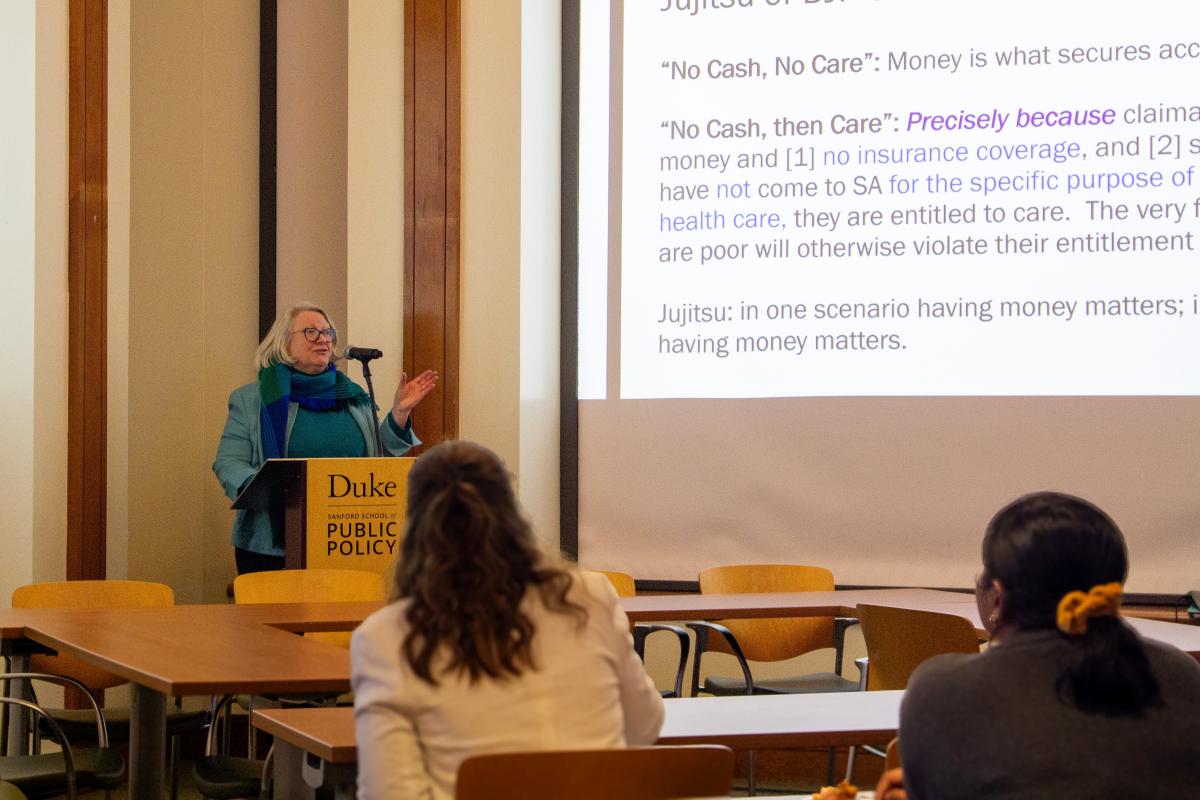Experiential Learning Sparks Opportunity for Interdisciplinary Dialogue: Reflections from 'No Cash? No Care' Simulation Workshop
Should nationality and documentation status affect a person's access to healthcare?
The Sanford Africa Policy Group (SAPG) recently hosted a workshop that explored entrenched discriminatory policies and examined the application of legal and policy tools to advocate for migrant rights and health equity in a transnational context.
Xenophobia among healthcare providers in South Africa is a major public health concern, as it directly impacts the quality of and access to care for migrants and asylum seekers. In a 2020 study of 277 healthcare providers in South Africa, 20% reported differential treatment of migrant patients.1
To help illustrate this issue, the event included a health and human rights court simulation based on the South African High Court case Section27 v. Gauteng Department of Health. The case brought attention to various practices and policies Gauteng health officials relied on to deny migrant women access to health care when pregnant or when seeking treatment for young children.
The simulation's actors included:
- Faustin Luhungu (MIDP’25) as the judge
- Eugénie Garagon (LLM’25) as the lead lawyer
- Pearl Teiko (MPP'25) as the claimant, Mrs. Kamba Azama
- Sydney Chen (T’25) as the courtroom deputy
- Eni Owoeye (MPP’25) as the master of ceremonies.
“I had to watch videos to study the mannerisms of judges and how they delivered remarks in court,” Luhungu shared about his experience preparing to play the judge. “It was a challenge, but a good challenge.”
Following the role play, Senior Lecturer Catherine Admay delivered remarks highlighting the importance of this case.
Section27 v. Gauteng Department of Health is a landmark ruling that helped remove systemic barriers to maternal and child healthcare for eligible permanent residents and impoverished families, she explained. The claimants in this case included women who were denied access to healthcare while pregnant and a mother whose young child was denied access to free health services. They were denied care due to financial barriers and migrant status.
These discriminatory healthcare practices were held to contradict the country's National Health Act, which obliges public clinics and community health centers to "fulfill...the rights of the People of South Africa...to have access to health care services," as well as the Constitution of South Africa, which recognizes that "everyone has the right to have access to health care services" within the parameters of available resources.
So long as the persons are not members or beneficiaries of medical aid schemes or have come to South Africa for the specific purpose of obtaining health care, the Gauteng High Court held that all pregnant women, lactating women and children under 6, "irrespective of their nationality and documentation status," are entitled to free health services at all public health establishments.2
“We challenged the audience to think about not just the social implications, but of the economic and policy considerations of expanding healthcare," Teiko shared. "How do you get people on board with that?”
Duke SAPG's mission is to fully bring Africa to life at the Sanford School of Public Policy by leading and supporting diverse policy discourse, academic enquiry, career development, knowledge exchange, cultural exhibition, and networking related to Africa within the Sanford community and across Duke.
This workshop brought together both undergraduate and graduate students from the Sanford School of Public Policy, Trinity College of Arts & Sciences, Fuqua School of Business, School of Law, and the Duke Global Health Institute.
The moral argument and public buy-in on Ubuntu principles are so relevant to many issues we are facing here in the United States and globally.
-Eni Owoeye MPP’25
“SAPG provided an opportunity for our community to learn from Africa, with Africa, rather than just learning about it or how to just help it,” Owoeye said. “The moral argument and public buy-in on Ubuntu principles are so relevant to many issues we are facing here in the United States and globally. I left [the event] feeling empowered that we can mobilize people to tackle these sensitive issues with more compassion and responsibility to the common good.”
1White, Janine A et al. “Social exclusion and the perspectives of health care providers on migrants in Gauteng public health facilities, South Africa.” PloS one vol. 15,12 e0244080. 28 Dec. 2020, doi: 10.1371/journal.pone.0244080
2Section 27. SECTION27 Welcomes Amended Policy Ensuring Access to Free Health Care for All Pregnant Mothers and Young Children and Partial Compliance by Gauteng Health with High Court Order – Section27. 24 Oct. 2023, https://section27.org.za/2023/10/section27-welcomes-amended-policy-ensuring-access-to-free-health-care-for-all-pregnant-mothers-and-young-children-and-partial-compliance-by-gauteng-health-with-high-court-order/.




